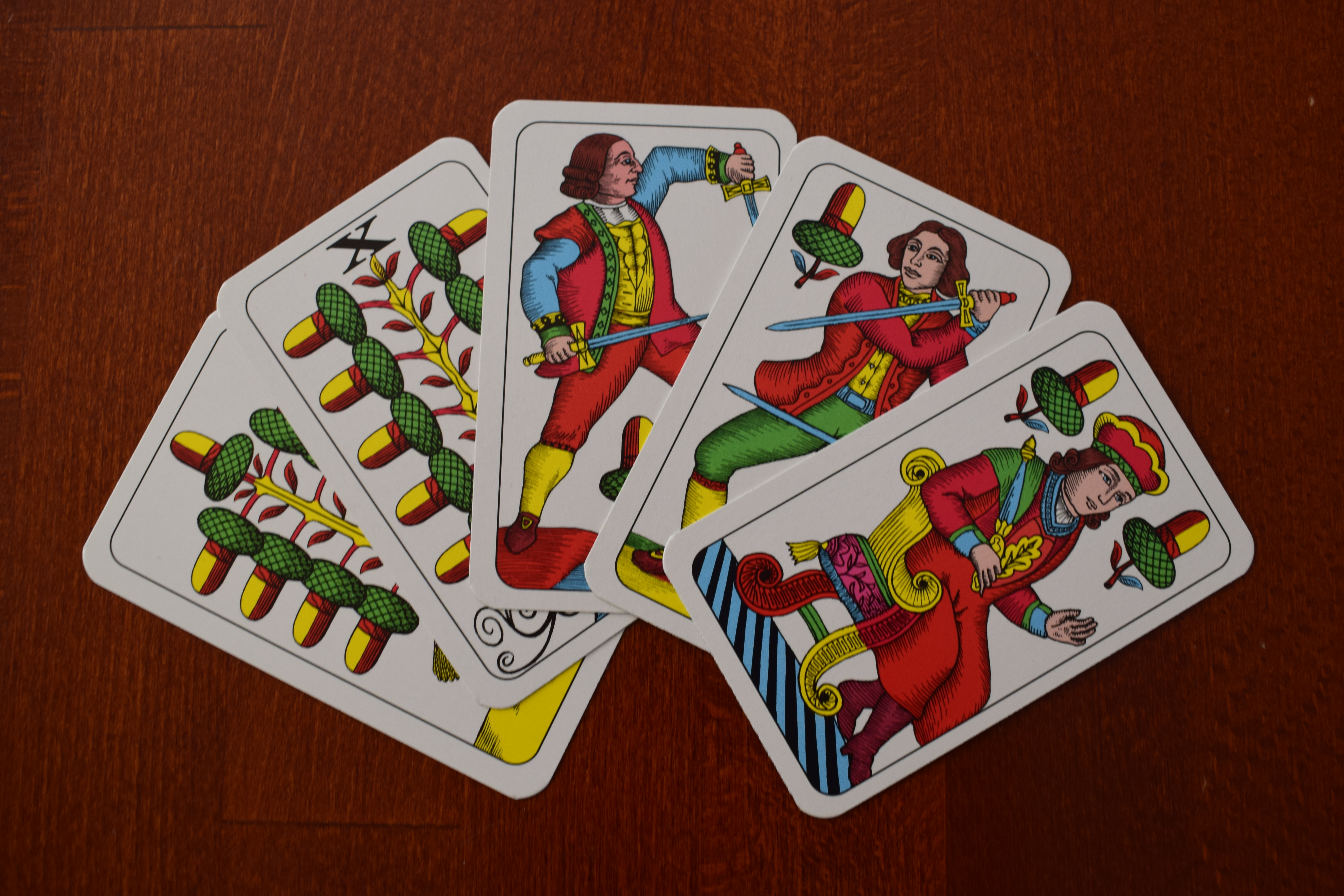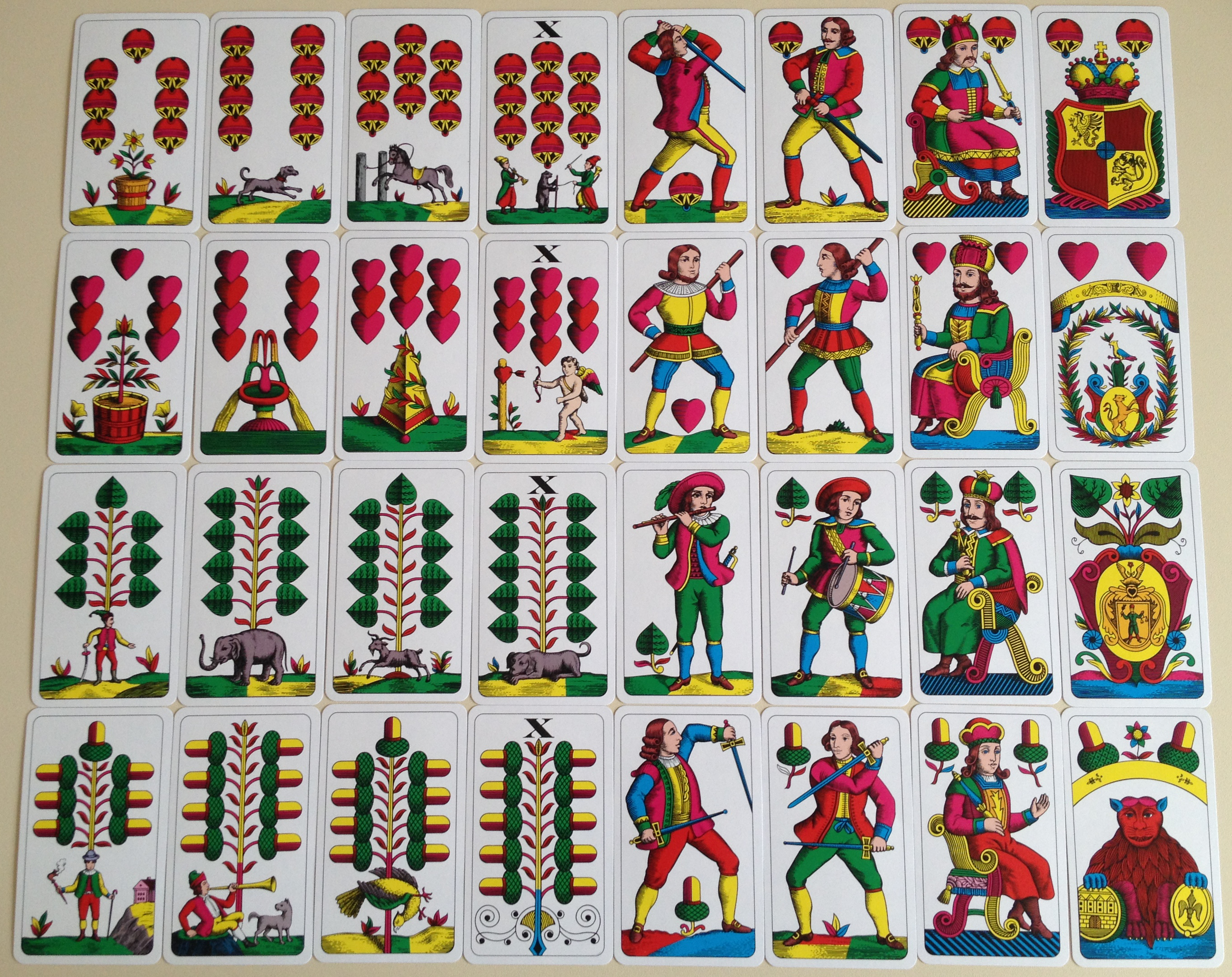|
Sedmice
Sedmice ("Seven") is a card game of the Sedma family played in the states of the former Yugoslavia. Like other games of this family, tricks are won by matching the led card in rank. In addition, the Sevens are wild, hence the name. In Croatia, the game is called Šuster. Overview Two players can participate, but the optimal number is four players (in two pairs). The game is played clockwise. Each player is initially dealt 4 cards. Cards Sedmica is played with 32 cards. If German suited cards are used the pack comprises: *4 x Sevens (''sedmica'') *4 x Eights (''osmica'') *4 x Nines (''devetica'') *4 x Tens (''desetica'') *4 x Unters (''dolnjak'') *4 x Obers (''gornjak'') *4 x Kings (''kralj'') *4 x Aces (''as'') Suits The cards typically have the following suits: Rules The basic motto of the game is: "A card takes a card, the Seven takes everything." The following rules are based on McLeod: [...More Info...] [...Related Items...] OR: [Wikipedia] [Google] [Baidu] |
Sedma Group
Sedma is a Czechs, Czech 4-card trick-and-draw game played by four players in fixed partnerships with a 32-card Bohemian-pattern pack. Card suits do not play a role in this game, and there is no ranking order. A trick is won by the last player to play a card of the same rank as the card led. The card game gives its name to the 'Sedma group' which includes closely related games such as the Finnish Ristikontra, the Yugoslavian Sedmice, the Romanian Șeptică, the Hungarian Zsírozás (also Zsíros or Zsír), the Bavarian Lusti-Kartl'n, the German Schmierer and the possibly Polish Hola (card game), Hola. These games have been described as highly unusual members of the Ace-Ten card games, Ace-Ten family, found only in Central and Eastern Europe.. Cards Normally a 32-card, German-suited, Bohemian-pattern pack is used; these are obtainable online. However, as in other games played with this pack it can be replaced by other German-suited cards, a French-suited Piquet pack comprising 3 ... [...More Info...] [...Related Items...] OR: [Wikipedia] [Google] [Baidu] |
Hola (card Game)
Sedma is a Czech 4-card trick-and-draw game played by four players in fixed partnerships with a 32-card Bohemian-pattern pack. Card suits do not play a role in this game, and there is no ranking order. A trick is won by the last player to play a card of the same rank as the card led. The card game gives its name to the 'Sedma group' which includes closely related games such as the Finnish Ristikontra, the Yugoslavian Sedmice, the Romanian Șeptică, the Hungarian Zsírozás (also Zsíros or Zsír), the Bavarian Lusti-Kartl'n, the German Schmierer and the possibly Polish Hola. These games have been described as highly unusual members of the Ace-Ten family, found only in Central and Eastern Europe.. Cards Normally a 32-card, German-suited, Bohemian-pattern pack is used; these are obtainable online. However, as in other games played with this pack it can be replaced by other German-suited cards, a French-suited Piquet pack comprising 32 cards from Ace to Seven in each suit. I ... [...More Info...] [...Related Items...] OR: [Wikipedia] [Google] [Baidu] |
Șeptică
Sedma is a Czech 4-card trick-and-draw game played by four players in fixed partnerships with a 32-card Bohemian-pattern pack. Card suits do not play a role in this game, and there is no ranking order. A trick is won by the last player to play a card of the same rank as the card led. The card game gives its name to the 'Sedma group' which includes closely related games such as the Finnish Ristikontra, the Yugoslavian Sedmice, the Romanian Șeptică, the Hungarian Zsírozás (also Zsíros or Zsír), the Bavarian Lusti-Kartl'n, the German Schmierer and the possibly Polish Hola. These games have been described as highly unusual members of the Ace-Ten family, found only in Central and Eastern Europe.. Cards Normally a 32-card, German-suited, Bohemian-pattern pack is used; these are obtainable online. However, as in other games played with this pack it can be replaced by other German-suited cards, a French-suited Piquet pack comprising 32 cards from Ace to Seven in each ... [...More Info...] [...Related Items...] OR: [Wikipedia] [Google] [Baidu] |
Lusti-Kartl'n
Lusti-Kartl'n or Lusti-Kartn is a Bavarian trick-taking, card game for four players with an unusual rule for winning the tricks. Like the Czech game of Sedma, the winner of a trick is the last one to play a card of the same rank as the led card. Players form two teams of two and thus are able to smear their partner's tricks or play blanks if they think their opponents will win the trick. The only counters are the Aces and Tens, worth 10 points each, and there are 10 more points for the last trick. The aim is thus to win 50 or more points. Background Lusti-Kartl'n is a point-trick game for 4 players in which the aim is to score 50 or more card points from a total of 90. Players form permanent teams of two, the partners sitting opposite one another. There are no trumps. Cards Lusti-Kartl'n is played with 32 cards from a Bavarian pattern pack; the Sixes are left out. The Aces and Tens are worth 10 points each; the remaining cards are non-counters. As taking the last trick earns ... [...More Info...] [...Related Items...] OR: [Wikipedia] [Google] [Baidu] |
Bay Laub
A bay is a recessed, coastal body of water that directly connects to a larger main body of water, such as an ocean, a lake, or another bay. A large bay is usually called a gulf, sea, sound, or bight. A cove is a small, circular bay with a narrow entrance. A fjord is an elongated bay formed by glacial action. A bay can be the estuary of a river, such as the Chesapeake Bay, an estuary of the Susquehanna River. Bays may also be nested within each other; for example, James Bay is an arm of Hudson Bay in northeastern Canada. Some large bays, such as the Bay of Bengal and Hudson Bay, have varied marine geology. The land surrounding a bay often reduces the strength of winds and blocks waves. Bays may have as wide a variety of shoreline characteristics as other shorelines. In some cases, bays have beaches, which "are usually characterized by a steep upper foreshore with a broad, flat fronting terrace".Maurice Schwartz, ''Encyclopedia of Coastal Science'' (2006), p. 1 ... [...More Info...] [...Related Items...] OR: [Wikipedia] [Google] [Baidu] |
Point-trick Games
A trick-taking game is a card or tile-based game in which play of a ''hand'' centers on a series of finite rounds or units of play, called ''tricks'', which are each evaluated to determine a winner or ''taker'' of that trick. The object of such games then may be closely tied to the number of tricks taken, as in plain-trick games such as contract bridge, whist, and spades, or to the value of the cards contained in taken tricks, as in point-trick games such as pinochle, the tarot family, briscola, and most evasion games like hearts. Trick-and-draw games are trick-taking games in which the players can fill up their hands after each trick. In most variants, players are free to play any card into a trick in the first phase of the game, but must ''follow suit'' as soon as the stock is depleted. Trick-avoidance games like reversis or polignac are those in which the aim is to avoid taking some or all tricks. The domino game Texas 42 is an example of a trick-taking game that is not a c ... [...More Info...] [...Related Items...] OR: [Wikipedia] [Google] [Baidu] |
Hungarian Card Games
Hungarian may refer to: * Hungary, a country in Central Europe * Kingdom of Hungary, state of Hungary, existing between 1000 and 1946 * Hungarians, ethnic groups in Hungary * Hungarian algorithm, a polynomial time algorithm for solving the assignment problem * Hungarian language, a Finno-Ugric language spoken in Hungary and all neighbouring countries * Hungarian notation, a naming convention in computer programming * Hungarian cuisine Hungarian or Magyar cuisine is the cuisine characteristic of the nation of Hungary and its primary ethnic group, the Magyars. Traditional Hungarian dishes are primarily based on meats, seasonal vegetables, fruits, bread, and dairy products. ..., the cuisine of Hungary and the Hungarians See also * * {{disambiguation Language and nationality disambiguation pages ... [...More Info...] [...Related Items...] OR: [Wikipedia] [Google] [Baidu] |
Smear (cards)
The following is a glossary of terms used in card games. Besides the terms listed here, there are thousands of common and uncommon slang terms. Terms in this glossary should not be game-specific (e.g. specific to Bridge, Hearts, Poker or Rummy), but apply to a wide range of card games. For glossaries that relate primarily to one game or family of similar games, see Game-specific glossaries. A ; Ace # The card with one pip in a pack of cards. Usually the highest card of a suit, ranking immediately above the King. May also occupy the lowest rank. # Commonly refers to the Deuce or Two in German-suited packs which don't have real Aces. Often the highest card of a suit. ; Acorns : One of the four suits in a German-suited pack of cards. Symbol: ; active # A card that is in play i.e. not sleeping. # See active player. ; active player # A player who receives cards in the current deal (i.e. is not sitting out because there are more players than the game is designed for as ... [...More Info...] [...Related Items...] OR: [Wikipedia] [Google] [Baidu] |
Talon (cards)
A talon (; French for "heel") in card games is a stack of undealt cards that is placed on the table to be used during the actual game. Depending on the game or region, they may also be referred to as the blind, kitty, skat, stock, tapp or widow (US). Description In 1909, Meyers Lexicon described the talon as ''"the cards left over after dealing..."'' In games of chance, such as Pharo it is ''"the stock of cards which the banker draws on"''. The talon is usually a pack of cards, placed face down, in the middle of the card table. In other games, there are however very different variations, for example in Königrufen. Talons may be placed face up or face down. Parlett describes a ''kitty'' as "the pool or pot being played for" or "a dead hand or widow". He also equates ''talon'' to ''stock'' as the "cards which are not dealt initially but may be drawn from or dealt out later in the play."Parlett, David. ''The Penguin Book of Card Games''. London: Penguin (2008), p. 642-646. . E ... [...More Info...] [...Related Items...] OR: [Wikipedia] [Google] [Baidu] |





